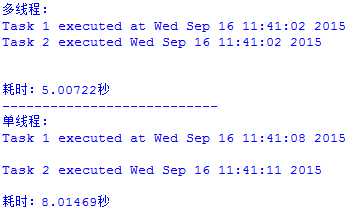标签:
个人总结创建多线程步骤:
1. import threading
2. 创建线程列表 threads = []
3. 开辟线程 t1 = threading.Thread(…………) 这里注意用args传参是个元组
4. for t in threads循环线程列表,在循环体中用t.setDaemon(True)设置为守护线程后,如果不设置为守护线程程序会被无限挂起,在调用t.start()开始
5. 在for循环外用t.jion()阻塞父线程
class threading.Thread()说明:
class threading.Thread(group=None, target=None, name=None, args=(), kwargs={})
This constructor should always be called with keyword arguments. Arguments are:
group should be None; reserved for future extension when a ThreadGroup class is implemented.
target is the callable object to be invoked by the run() method. Defaults to None, meaning nothing is called.
name is the thread name. By default, a unique name is constructed of the form “Thread-N” where N is a small decimal number.
args is the argument tuple for the target invocation. Defaults to (). 注意这里是个元组
kwargs is a dictionary of keyword arguments for the target invocation. Defaults to {}.
If the subclass overrides the constructor, it must make sure to invoke the base class constructor (Thread.__init__()) before doing
anything else to the thread.
程序1:
1 #coding=utf-8 2 import threading #导入threading包 3 from time import sleep,ctime 4 import time 5 6 def task1(): 7 print ("Task 1 executed at %s\n" %ctime()) 8 sleep(3) 9 10 def task2(): 11 print ("Task 2 executed %s\n" %ctime()) 12 sleep(5) 13 14 print("多线程:") 15 starttime=time.time(); #记录开始时间 16 threads = [] #创建一个线程列表,用于存放需要执行的子线程 17 t1 = threading.Thread(target=task1) #创建第一个子线程,子线程的任务是调用task1函数,注意函数名后不能有() 18 threads.append(t1)#将这个子线程添加到线程列表中 19 t2 = threading.Thread(target=task2)#创建第二个子线程 20 threads.append(t2)#将这个子线程添加到线程列表中 21 22 for t in threads: #遍历线程列表 23 t.setDaemon(True) #将线程声明为守护线程,必须在start() 方法调用之前设置,如果不设置为守护线程程序会被无限挂起 24 t.start() #启动子线程 25 t.join()#jion()的作用是,在子线程完成运行之前,这个子线程的父线程将一直被阻塞 26 endtime=time.time();#记录程序结束时间 27 totaltime=endtime-starttime;#计算程序执行耗时 28 print ("耗时:{0:.5f}秒" .format(totaltime)); #格式输出耗时 29 print(‘---------------------------‘) 30 31 #以下为普通的单线程执行过程,不需解释 32 print("单线程:") 33 starttime=time.time(); 34 task1(); 35 task2(); 36 endtime=time.time(); 37 totaltime=endtime-starttime; 38 print ("耗时:{0:.5f}秒" .format(totaltime));
运行结果:

程序2:
1 import threading 2 from time import sleep,ctime,time 3 4 def music(m): 5 print("I am listening %s at %s"%(m,ctime())) 6 sleep(2) 7 8 def movie(v): 9 print("I am seeing %s at %s" %(v,ctime())) 10 sleep(4) 11 12 threads = [] 13 t1 = threading.Thread(target=music,args=("心动",)) 14 threads.append(t1) 15 t2 = threading.Thread(target=movie,args=("煎饼侠",)) 16 threads.append(t2) 17 18 if __name__ == ‘__main__‘: 19 for t in threads: 20 t.setDaemon(True) 21 t.start() 22 t.join() 23 print("all the threads over at %s" %ctime())
运行结果:

程序3:
socket server和client双向传文件,这里文件路径是写死的,根据自己需求修改:
server:
1 #coding=utf-8 2 import socket 3 import threading 4 from time import ctime 5 6 BUFFERSIZE = 1024 7 HOST = ‘127.0.0.1‘ 8 PORT = 9999 9 10 #建立socket连接 11 s = socket.socket(socket.AF_INET,socket.SOCK_STREAM) 12 s.bind((HOST,PORT)) 13 s.listen(1) 14 conn,addr = s.accept() 15 print("Conneted by: %s"%(addr,)) 16 17 #收文件 18 def recvfile(filename): 19 f = open(filename,‘wb‘) 20 while True: 21 data = conn.recv(BUFFERSIZE) 22 if str(data)[-4:] == ‘EOF\‘‘: 23 f.write(data[:-3]) 24 break 25 f.write(data) 26 f.close() 27 print("File received from: %s at %s"%(addr,ctime())) 28 29 def sendfile(filename): 30 f = open(filename,‘rb‘) 31 f_data = f.read() 32 f.close() 33 conn.sendall(f_data) 34 conn.send((‘EOF‘).encode()) 35 print("Server send finished at %s" %ctime()) 36 37 recvname = "d:\\2.mp4" 38 sendname = "d:\\a.mp4" 39 40 threads = [] 41 t1 = threading.Thread(target=recvfile,args=(recvname,)) 42 threads.append(t1) 43 t2 = threading.Thread(target=sendfile,args=(sendname,)) 44 threads.append(t2) 45 46 if __name__ == "__main__": 47 48 for t in threads: 49 t.setDaemon(True) 50 t.start() 51 t.join() 52 conn.close()
client:
1 import socket 2 import threading 3 from time import ctime 4 5 BUFFERSIZE = 1024 6 HOST = ‘127.0.0.1‘ 7 PORT = 9999 8 9 s = socket.socket(socket.AF_INET,socket.SOCK_STREAM) 10 s.connect((HOST,PORT)) 11 12 def sendfile(filename): 13 f = open(filename,‘rb‘) 14 f_data = f.read() 15 f.close() 16 s.sendall(f_data) 17 s.send((‘EOF‘).encode()) 18 print("Client send finished at %s" %ctime()) 19 20 def recvfile(filename): 21 f = open(filename,‘wb‘) 22 while True: 23 data = s.recv(BUFFERSIZE) 24 if str(data)[-4:] == ‘EOF\‘‘: 25 f.write(data[:-3]) 26 break 27 f.write(data) 28 f.close() 29 print("File received from: %s at %s"%(HOST,ctime())) 30 31 sendname = "e:\\1.mp4" 32 recvname = "e:\\b.mp4" 33 34 threads = [] 35 t1 = threading.Thread(target=sendfile,args=(sendname,)) 36 threads.append(t1) 37 t2 = threading.Thread(target=recvfile,args=(recvname,)) 38 threads.append(t2) 39 40 41 if __name__ == "__main__": 42 for t in threads: 43 t.setDaemon(True) 44 t.start() 45 t.join() 46 s.close()
标签:
原文地址:http://www.cnblogs.com/raichen/p/4812829.html